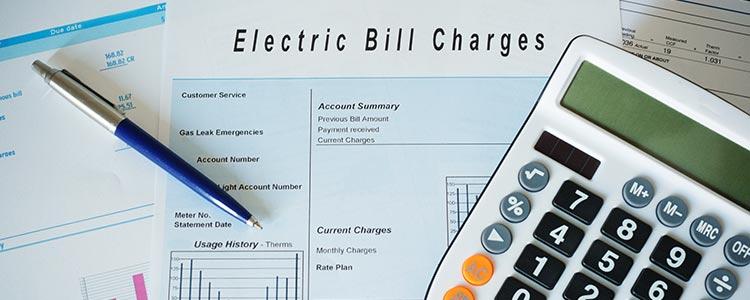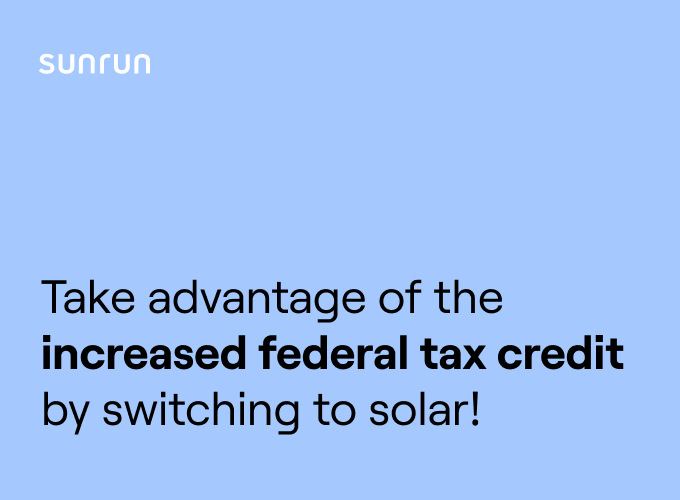Federal and State Incentives for Going Solar

Sunrun’s Essential Guide to Solar Panel Incentives in 2018
Learn about solar incentives and how they work.
Solar energy in the U.S. is growing at an unprecedented rate, and with more than 53 gigawatts (GW) of solar photovoltaic (PV) capacity installed to date, our nation now generates enough power to electrify over 10 million homes. A number expected to double by 2023, so in the next five years, approximately 15 GW of solar PV capacity will be installed annually in the U.S.1
To encourage more homeowners like you to go solar, governments, electric utilities and other organizations offer financial incentives, rebates, and tax credits that make solar more affordable when you purchase a system through a solar plan, such as Sunrun’s BrightBuy™ or BrightAdvantage™. Depending on the state you’re living in, you could reduce the cost of your new solar panels from 30% to 50%.2

See if you qualify for the
26% federal tax credit
Thanks so much! We'll call you shortly.
Sorry, we are not taking new customers in your area yet
Refer a friend. Get $1000
5 Types of Solar Rebates and Incentives in the U.S.
1. Federal Solar Tax Credit
Many homeowners are left wondering, do you get a tax credit for solar panels? The short answer is yes. The federal solar tax credit gives you a dollar-for-dollar reduction against your federal income tax. Currently, the residential federal solar tax credit gives you a dollar-for-dollar reduction against your federal income tax equal to 26% of the final cost of solar energy systems you install on your home. This benefit exists through December 31, 2022. In 2023 the residential tax credit will step down step down to 22%. In 2024, the tax credit for residential solar ends.
2. Net Energy Metering (NEM)
Net Energy Metering (NEM) is a billing arrangement which measures the energy your home pulls from your utility’s electrical grid, as well as the excess energy your solar panels produce and export back to the grid. Not all states have net energy metering policies, and these policies vary by state.
To keep track of the energy going in and out of your home, your utility company will provide you with a net meter, and in case there’s a surplus, your energy meter will run backward and you’ll get a monetary or kWh credit. You can use your kWh credit on days when your system isn’t producing enough energy, such as cloudy days or at night.4
3. Solar Renewable Energy Credits (SRECs)
In some states, homeowners can earn and sell Solar Renewable Energy Credits (SRECs) for the electricity their solar system produces. Many utility companies must purchase a certain amount of SRECs each year to meet sustainability requirements set by their state’s Renewable Portfolio Standard (RPS) programs, and prove that a certain portion of their energy comes from clean, renewable sources.5
For every 1,000 kilowatt-hours (kWh) of electricity generated by the solar panels on your roof, you’ll earn 1 SREC, which you can later sell to your utility to earn additional income. An SREC could be worth as much as $3006, but since they’re sold on an open market, prices may fluctuate. Think of the SREC market like the stock market, so the more demand for SRECs there is from utilities, the higher their price will be.
Please consider that the only way to own your SRECs is if you fully purchase your solar system. If you choose to go solar through a PPA/lease solar plan, such as BrightSave™ Monthly or BrightSave™ Prepaid, we’ll hold the SRECs and pass the value onto you as savings via a lower electricity rate. On the bright side, you’ll get the financial benefits of the SRECs without the market risks.
4. Solar Tax Exemptions
Aside from federal solar tax credits, several state and local governments also offer property and sales tax exemptions to help make your switch to solar as affordable as possible.7
- Property Tax Exemptions:
- Allow homeowners to remove the added value of their solar panels from the valuation of their home for tax purposes. This means that even if you experience a jump in property value due to the solar installation, you’ll be taxed as if your panels aren’t there.
- Sales Tax Exemptions:
- Provide an exemption from the state sales tax (or sales and use tax) for the purchase of a home solar system. This type of exemption lets you reduce the upfront costs of your solar panel installation, and may include sales, storage, and use of components used in solar energy systems.
5. Cash Rebates
Some state and local governments, as well as utility companies and other organizations, offer cash rebates to homeowners who choose to buy a PV system. These type of rebates are usually available for a limited time and end once a certain number of solar systems are installed in the area. Cash rebates can help you reduce your solar system cost even more, in some cases by as much as 10% to 20%.8
What are The Available Solar Tax Incentives for My State?
For the most comprehensive and up-to-date information about the current state incentives in the U.S., check out the Database of State Incentives for Renewable Energy.
Learn about the solar incentive programs by state where Sunrun offers solar products and services.
Is Solar a Smart Investment Without Rebates and Incentives?
Even if your state has zero solar incentives or rebates, once you purchase your system you can still enjoy the federal solar tax credit, while reducing your electricity bill, saving money each month and helping the environment.
For additional solar resources, please visit Sunrun’s Solar Education Center. If you are looking to speak with one of our solar consultants, please contact us today.
David Zeledon
Recommended Articles
-

System Insurance
Sunrun insures their solar systems for up to $1 million/year per location.
-

mySunrun
A web app available to Sunrun customers to track and monitor your Sunrun solar system.
-

Solar Consultation
Personalized solar energy consultation with Sunrun. Can be done in person or remotely.
-

Top 3 Reasons to Go Solar Now
Thinking of Going Solar? You're Not Alone If you are thinking of going solar like...